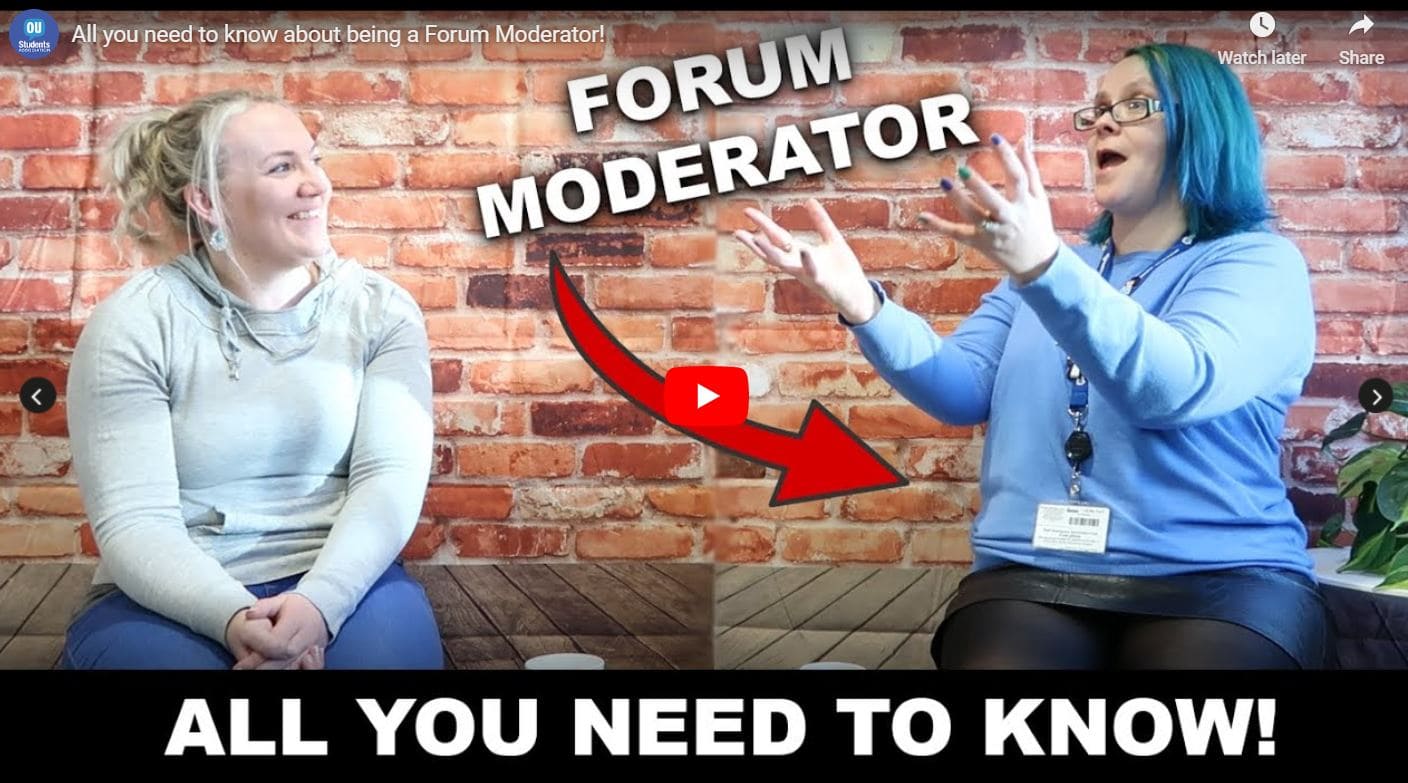Without any real warning or opportunity for planning, almost all SUs have suddenly moved from physical, face to face based organisations to ones operating in the cloud.
So what happens when all your members are in the cloud and may well get through all their studies without ever meeting an SU rep or member of staff in person? There aren’t any magic wands – but the Open University’s Students’ Association has had plenty of years of practice – and we wanted to try to share some lessons from how we operate.
Representing students
Most SUs spend a lot of time training representatives – but at the OU we’ve learned over the years that putting a bunch of academics and university staff in a room with a student rep on Skype isn’t a recipe for effectiveness – and when everyone’s on Skype, things get even worse without training not just for reps, but for the other participants too.
Those new both to virtual meetings and the impertinence of students raising uncomfortable things need training and to constantly evaluate whether the “meeting” is working. Chairs need relevant information to involve student reps in meetings and to not forget they are there. And much more committee collaboration has to happen “offline”, and between meetings, for things to work.
This is all particularly important for those meetings that are less about “actions” and “planning” and more about debate and nuance. The latter are really really hard to get right online, whatever the tech companies say – and even harder to chair when you can’t “sense” the room. It means that our student reps in particular have to learn to be more assertive early on than many other officers or reps we’ve met.

Meeting chairs of committees when reps or officers start their role helps us get what students have been telling us onto agendas. Staff involvement in supporting officers and reps is pretty crucial too. And to make sure students feel empowered to raise issues and contribute freely in the meeting, chairs have to actively invite student contributions – and we feed back when they don’t.
On your side, in the open
Talking to other SUs, lots seems to happen “behind closed doors” – but once more happens “online”, it’s much harder to maintain a culture of quiet meetings in corridors – and it’s probably unhealthy anyway.
For example – for us, it’s pretty crucial that agendas are as open as possible with a minimum of reserved business. We always try to speak to students on social media and forums before formal and informal meetings about subjects that coming up – and the threads get pretty long, but are always useful. Being able to quote from real students when making a point is a handy weapon when we’re being fobbed off.
Because everything’s online, we have developed a habit of over sharing… the SUs policies and statements. When we’ve been to a meeting, we’ll try to remember to share what happened – what we said on students’ behalf, the rights we were trying to secure or uphold, or the actions we asked the university to take.
Reps and officers hardly get to meet in person, so getting us communicating with each other about shared concerns across committees is really important – otherwise it can feel like it’s us and the bit of the university we interact with. And we also make it a priority to actively update students, online, on any new issues coming up that the SU is aware of, or any new campaigns or policies/ positions the SU wants to take. It’s easy to assume people will have read everything – but we are constantly reminded that they may well not, or at least may well not remember.
Training
Loads of people ask me how I got trained as an officer. What I can tell you is that not only is university teaching hard to just “put online”, officer training is even harder to just “convert” like that. We’ve heard stories in the past of the OU students’ association trying to run training days for an entire day, but it was way too intense for everyone – particularly the presenters. So we split it into smaller sessions, get people to fill in polls, give their views, and give people some of the material as a pre-read – focusing live sessions on discussing it.
Communications
Because we can’t bump into people in the office, we all have to make constant notes of the things we have been up to and share them with other reps and staff – so people know what’s happening in the organisation. We have a dedicated forum space, and a regular way of updating everyone. It’s important to have the opportunity for informal relationship-building casual comms as well as the purposeful variety.
We have also found that it’s very easy to inadvertently leave people out when we’re communicating at a distance – because we don’t see them around, so actively thinking “who else does this affect”, “who else might have a valuable input into this, even if it’s not their role” etc is a good plan, and something good to actively practice in training sessions.
We also all have to learn how to communicate in ways that students will see and understand rather than leaving that to our comms team. Our weekly meeting with the head of X or the dean of y is important but students want to know the essentials – things like how their exam arrangements are going to happen now that everything is cancelled.
Socialising
I can’t lie – this isn’t easy at arm’s length. Our score on NSS 21 (“I feel part of a community of staff and students”) isn’t great – although we do beat the LSE.
There’s two things we’ve found that are important. The first is that relying on supporting societies to put things on for their members, or putting on paid for physical events – are both staples of social activity in the SUs I’ve visited but don’t work at all for us.
Variety matters, and we keep it basic. Sessions for general chit-chat that are themed can work. Online pub quizzes can work really well. Virtual fashion parades, drinks-at-a-distance, club nights online, cookery classes, best pet-being-annoying photo – you name it, it can work. Giving students a space to vent is also part of our repertoire – venting online can be just as therapeutic as in person – but we have to be wary that people can come across unduly harsh in writing, so we are careful to train up moderators and set ground rules.

One thing we know our students miss out on without extra effort is the sort of mutual academic support that you get from popping to the cafe or chatting to housemates. We try very hard to make Facebook and WhatsApp groups work for that. But it does mean we have to invest time in helping and supporting admins with their role – because discussing your essay plan with a couple of mates over coffee is different to advising on collusion or plagiarism within a group of a few tens or hundreds of people. The rumour mill can really go into overdrive too – “our” people have to know when to spot something so we can discuss and dampen it down quickly.

Lots of SUs are kind of required to regulate their societies – but students do set up their own online communities outside of the SA, and if we try to police them, there is usually plenty of pushback. We’re having an active debate about harassment and misconduct online, but whatever happens we know we necessarily have a different approach over student groups to “normal” SUs.
Support
Support services for students can work at a distance too. Many universities already have access to the Big White Wall – if yours hasn’t, press them to! We also do manage to sustain a nightline – and we run other support services online through social media too, creating dedicated accounts that are just for that support role.
We also train anonymous peer supporters. It’s a bunch of 2nd or 3rd year students who have been around for a little while who become available for students – a listening ear has always come in handy for our more isolated students!
Bridging and introverts
The final thing to say is that being almost totally online means two big differences “just under the surface” that probably would be good to get out in the open. The first is that the heavily mediated nature of communication between our students means that there’s much more “bridging” social capital being developed – by which I mean, people that are different interacting with each other, talking to each other and debating with each other. Age, class, ethnicity – all sorts of things matter less. This is hugely positive in comparison to some of the social culture I see at friends’ universities, but it also creates problems – and having the time and capacity to address those is part of our job rather than an add on. If nothing else, our students probably miss out on some of the “bonding” social capital benefits that students get by hanging out with people just like them.
The other big difference is the diversity in the people who get involved in the association. The “public” nature of democracy in traditional SUs looks like it would put loads of our reps off – many of ours have said they would never have got involved in the association as a volunteer or rep if it was “physical”. Again, this is a real positive – but managing and mediating that diversity can be exhausting too.

None of the above is unique to us, and much of it might already be happening elsewhere. We’ve also kept an eye on some of the amazing things other SUs have been doing all week to steal ideas – we can all get stuck in our routines. But hopefully there’s lessons to learn about supporting, representing and organising students online that can last us not just through Covid-19, but out and into what will hopefully be a “normal” next year.




















